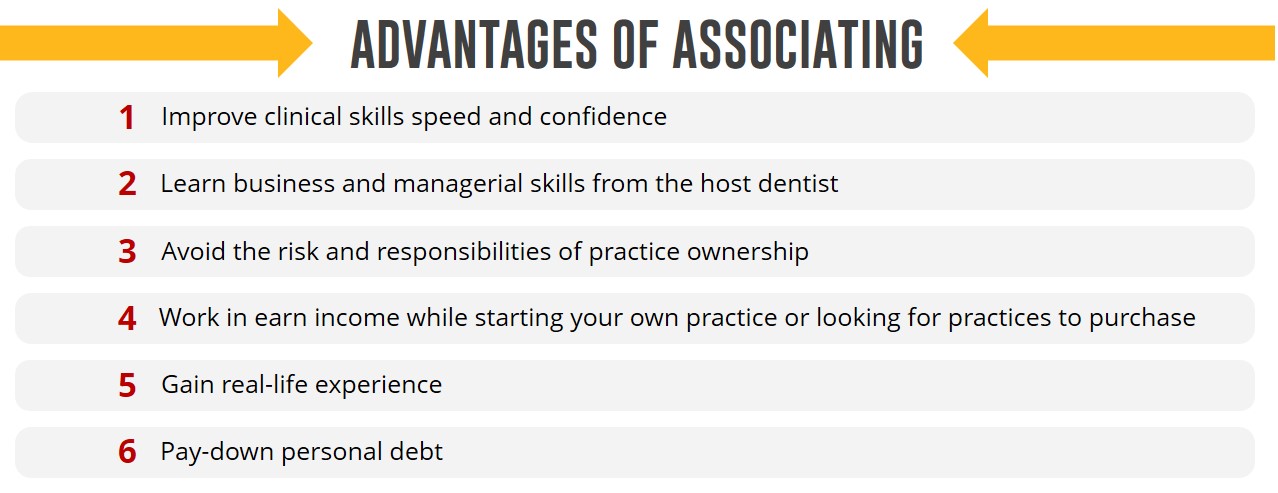Associating | What you need to know
Working as a non-owning associate is by far the most common choice among dentists who are starting their careers. Starting your career by serving as an associate can be a great way to get a feel for what it would be like to own and operate your own practice.
There is risk in any job but often the primary risk involved in serving as an associate would be inadequate pay. You’ll want to make sure that your cash flow needs are being met by your compensation, otherwise you will need to pick up a second and maybe even a third associate position. It is frequently difficult for practice owners to determine how much work they will have for associates. On top of that risk, practice owners normally perform the higher dollar procedures and leave the lower dollar procedures to associates. To protect yourself, you may want to negotiate a set minimum rate of compensation per day, per week, per month or for the year. As an associate you will be receiving far less income for the work that you perform than income that the host owner would receive performing the same exact work himself or herself. But the trade-off is in the short run, it can be good experience.
As an associate, you will need to work as your employer directs. Sometimes the policies and procedures that associates are expected to abide by are in conflict with an associate’s training, philosophy of care and ethics. Some employers may require you to recommend treatment plans that are marginal at best and at worst, unnecessary or inappropriate.
As a new associate, do not expect the owner to have all the modern technology that you may have used while in dental school. This can be frustrating to you because you may want to provide dental services in a manner to which you are accustomed.
As an associate, there is the risk of being fired. You will want to have a clear written agreement with a host owner about cause for termination. There can be termination for cause and termination without cause. Avoid signing an agreement with a non-compete area and period of time that is unreasonable. Numerous attorneys have stated that it is unlikely that courts in Ohio would support a non-compete period of time greater than two years. There is no set maximum non-compete distance from a practice but practically speaking anything beyond 10 miles could eliminate most of many given metropolitan areas. Rely on professional legal advice to negotiate associate contract terms. Attorneys with experience serving dental practitioners are the best choice.
If you are considering a partnership buy-in, you need to be aware that more of these fail than succeed. Many dental practitioners are great clinicians but they don’t have the skills or training to manage and implement practice transitions. Two primary reasons for this are sellers not having enough business to provide income for both the owner operator and the associates and secondly disagreement over the selling price of the practices.
SO WHAT WORK COULD YOU EXPECT AS AN ASSOCIATE?
You will likely be expected to cover more of the basic work, more emergency calls and work more non-traditional office hours like evenings and weekends. It is common that there is a shift of the higher dollar procedures to the practice owners and away from associates. You will want to protect yourself by making sure that you have a minimum daily amount that you will be paid.
As associates are usually paid a percentage of their own production or sometimes a percentage of their collections from their work. In rural communities away from metropolitan areas, a significant per diem rate is common. Associates generally do not receive much in the way of benefits. If you do have an opportunity to be in a group health insurance plan or pension plan, most likely the host dentist will not pay for the additional cost over and above your agreed upon compensation amount.
Everyone’s standard of living is different. You may have significant school debt or you may have none at all. You will need to determine if the amount of compensation that you would receive as an associate is adequate to meet your needs. If there is not enough work in the practice to keep you busy, then how are you going to pay your bills? If you find yourself in a situation where your chosen associate’s position is not generating adequate income, you will need to pick up a second or possibly a third part-time associate position.



